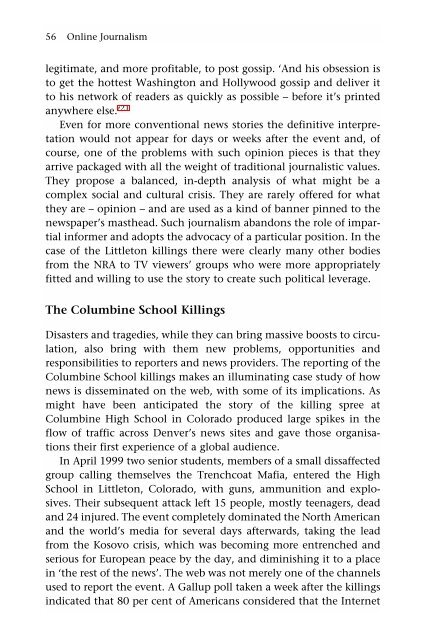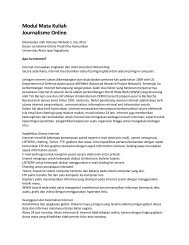Online Journalism - Ayo Menulis FISIP UAJY
Online Journalism - Ayo Menulis FISIP UAJY
Online Journalism - Ayo Menulis FISIP UAJY
You also want an ePaper? Increase the reach of your titles
YUMPU automatically turns print PDFs into web optimized ePapers that Google loves.
56 <strong>Online</strong> <strong>Journalism</strong><br />
legitimate, and more profitable, to post gossip. ‘And his obsession is<br />
to get the hottest Washington and Hollywood gossip and deliver it<br />
to his network of readers as quickly as possible – before it’s printed<br />
anywhere else.’ 21<br />
Even for more conventional news stories the definitive interpretation<br />
would not appear for days or weeks after the event and, of<br />
course, one of the problems with such opinion pieces is that they<br />
arrive packaged with all the weight of traditional journalistic values.<br />
They propose a balanced, in-depth analysis of what might be a<br />
complex social and cultural crisis. They are rarely offered for what<br />
they are – opinion – and are used as a kind of banner pinned to the<br />
newspaper’s masthead. Such journalism abandons the role of impartial<br />
informer and adopts the advocacy of a particular position. In the<br />
case of the Littleton killings there were clearly many other bodies<br />
from the NRA to TV viewers’ groups who were more appropriately<br />
fitted and willing to use the story to create such political leverage.<br />
The Columbine School Killings<br />
Disasters and tragedies, while they can bring massive boosts to circulation,<br />
also bring with them new problems, opportunities and<br />
responsibilities to reporters and news providers. The reporting of the<br />
Columbine School killings makes an illuminating case study of how<br />
news is disseminated on the web, with some of its implications. As<br />
might have been anticipated the story of the killing spree at<br />
Columbine High School in Colorado produced large spikes in the<br />
flow of traffic across Denver’s news sites and gave those organisations<br />
their first experience of a global audience.<br />
In April 1999 two senior students, members of a small dissaffected<br />
group calling themselves the Trenchcoat Mafia, entered the High<br />
School in Littleton, Colorado, with guns, ammunition and explosives.<br />
Their subsequent attack left 15 people, mostly teenagers, dead<br />
and 24 injured. The event completely dominated the North American<br />
and the world’s media for several days afterwards, taking the lead<br />
from the Kosovo crisis, which was becoming more entrenched and<br />
serious for European peace by the day, and diminishing it to a place<br />
in ‘the rest of the news’. The web was not merely one of the channels<br />
used to report the event. A Gallup poll taken a week after the killings<br />
indicated that 80 per cent of Americans considered that the Internet
















